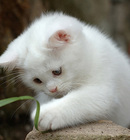Москва
The Russian word for Moscow is Москва. It's а perfectly regular second declension noun:
| Я каждое лето летаю в Москву. | Every summer I fly to Moscow. |
| В Москве живёт одиннадцать миллионов человек. | Eleven million people live in Moscow. |
| Москва — столица Российской Федерации. | Moscow is the capital of the Russian Federation. |
| Санкт-Петербург находится в шестистах тридцати километрах от Москвы. | Saint Petersburg is located 630 kilometers from Moscow. |
| Москву основал Юрий Долгорукий. | Moscow was founded by Yuri Dolgorukiy. |
Now if you are a foreigner and you want to prove how stupid an American is, simply ask “What is the name of the main river that runs through Moscow?” Sadly, most Americans will probably look at you like a deer caught in headlights and say “Idunno.” (I'm sitting in my favorite coffee shop as I type this entry, and I just tried that question on the barista. He was stumped.) It's funny. Sometimes American education produces profoundly well-rounded and insightful people, but when it comes to geography almost all Americans come up short.
So for my American readers I should point out that the main river that runs through Moscow is called… are you ready for this?… the Moscow River! (Москва-река in Russian, always hyphenated.)
| Москва-река течёт через центр города. | The Moscow river flows through the center of the city. |
| Алёшин дедушка ловит рыбу в Москве-реке. | Alyosha's grandfather fishes in the Moscow River. |
| В выходные мы ходили на Москву-реку. | On the weekend we went to the Moscow River. |
| Народ любит загорать на Москве-реке. | People love to sunbathe on [the shores of] the Moscow River. |
Ломать/сломать & ломаться/сломаться

A little while ago I wrote about words that can have multiple meanings because of their use in Russian slang. The verb «ломать» as well as its reflexive form «ломаться» are also such words.
The main meaning of this verb is “to break”. However, someone could say меня ломает to express a feeling of withdrawal after using drugs or when being sick and running high fever. Consequently, the word for withdrawals is «ломка».
| Когда моя кошка опрокинула вазу, тюльпаны упали на пол и их стебли сломались. | When my cat knocked a vase over, the tulips fell on the floor and the stems got broken. |
| — Катя, зачем ты сломала Ленину куклу? — Потому, что она не давала мне с ней играть! |
“Katya, why did you break Lena’s doll?" “Because she wouldn’t let me play with it!” |
| На улице было очень скользко. Я упала и сломала руку! | It was very slippery outside. I fell and broke my arm. |
| — Почему Костя так себя ведёт? — Его ломает: он пытается бросить принимать наркотики. |
“Why is Kostya acting this way?” “He’s having withdrawals from trying to quit taking drugs.” |
There is also a rather well used idiom using this verb: «ломать себе голову». It means to puzzle or rack one's brains over something.
| Я ломаю себе голову, пытаясь понять, как это случилось. | I am puzzled trying to understand how it happened. |
The reflexive form, ломаться, means to quit working or functioning.
| У меня поломалась машина, можешь подвезти? | My car broke; could you give me a ride? |
However, ломаться can also mean, “crack” when referencing changes in a young’s man’s voice.
| У Васи голос уже ломается, он становится мужчиной. | Vasya’s voice is cracking; he’s becoming a man. |
Also, ломаться has two other meanings in Russian slang. The first one is to "put on airs, while the second one is to "stubbornly refuse to concede".
| Ну что ты ломаешься? Не можешь нормально говорить? | Why are you putting on airs? Can’t you speak normally? |
| Дима, тебя все упрашивают, а ты ломаешься! Ну, кто так делает? | Dima, everyone is begging you and you are stubbornly refusing! Who does that? |
Here's a video from Kira Muratova's movie. Her movies are always very unique. More often than not the main character is played by Renata Litvinova, who is the queen of putting on airs.
If you would like to see a transcript and translation of this clip, click here.
Знакомиться/познакомиться
If you want to say that you met someone for the first time in such-and-such a place, then the verb to use is знакомиться/познакомиться, which is conjugated like this:
| Imperfective | Perfective | |
| Infinitive | знакомиться | познакомиться |
| Past | знакомился знакомилась знакомилось знакомились |
познакомился познакомилась познакомилось познакомились |
| Present | знакомлюсь знакомишься знакомится знакомимся знакомитесь знакомятся |
No such thing as perfective present in Russian. |
| Future |
буду знакомиться будешь знакомиться будет знакомиться будем знакомиться будете знакомиться будут знакомиться |
познакомлюсь познакомишься познакомится познакомимся познакомитесь познакомятся |
| Imperative | знакомься знакомьтесь |
познакомься познакомьтесь |
The verb can express the idea that two people met in two different ways. Either a) one person is the subject of the verb and the other is the object of the preposition с + instrumental, or b) they can both be part of the subject of the verb. Thus if Lyudmila wants to say that she met Gleb last year, she may use either of these sentences:
В прошлом году я познакомилась с Глебом. Мы с Глебом познакомились в прошлом году. |
Last year I met Gleb. |
Other examples:
| — Когда вы с Сашей познакомились? — Мы с ним познакомились ещё в институте. |
“When did you and Alexander meet each other?” “We met back in college.” |
| — Где познакомились Петя с Настей? — Они познакомились в тюрьме. — Правда? Я даже не знал, что они сидели. — Да ты что, они не сидели, а служили надзирателем и медсестрой. |
“Where did Peter and Natalya meet?” “They met in prison.” “Really, I hadn't realized that they had served time.” “Don't be silly. They weren't serving time. He was working as a guard and she as a nurse.” |
| Через месяц мы будем посещать Белый дом. Если будет возможность, я очень хочу познакомиться с Бараком Обамой. | In a month we are going to visit the White House. If there is an opportunity, I really want to meet Barak Obama. |
This verb cannot be used to say “I met Tanya at the airport” in the sense of “I went to the aiport to pick her up.” For that meaning you have to use the verb встречать/встретить, which we will discuss in the weeks to come.
Note the вы imperative познакомьтесь: to see a discussion of it's usage, see this blog entry.
Класс (часть первая)
Why is it that complicated words in a language never cause problems, but simple words do? I mean, no foreigner who studies Russian ever messes up a sentence with the phrase дезоксирибонуклеиновая кислота in it, but Americans who speak Russian misuse the word класс all the time.¹ Let's get to the heart of the matter. First of all, the word класс has multiple meanings that we will address over the next couple of weeks. Today we'll start with its most physical meaning, which is classroom, like the classrooms you find in a grade school or high school:
| Преподавательница вошла в класс. | The teacher entered the classroom. |
| В каждом классе висел красный флаг. | Each classroom had a red flag. |
| Из класса выбежали ученики. | The students ran out of the classroom. |
| Когда я подходил к классу, слышно было, как шумели дети. | As I approached the classroom, you could hear the noisy children. |
The trouble with the word for college-age Americans comes from the English usage “I am going to class.” In English the phrase means something like “I am about to attend the regularly scheduled event by which knowledge is passed on to me.” Even if your class is not meeting in a regular classroom, we still use the word class; for instance, “Today the professor is holding class in a conference room at the museum.” The sentence «Я иду в класс» means “I am going to the classroom.” It does NOT mean “I am going to class” in the normal English meaning. For that purpose one says “Я иду на занятия.” Notice that занятия is a neuter plural noun, but despite its plurality we will usually translate it as a singular in English, although sometimes the plural sounds okay as well:
| Я иду на занятия. | I am going to class. |
| — Откуда ты идёшь? — С занятий. |
“Where are you coming from?” “From class.” |
| — Где Паша? — На занятиях. |
“Where is Pavel?” “He's at class.” or “He's in class.” or “He's at school.” |
| Сегодня нет занятий. | “There's no class today.” or “There are no classes today.” |
¹ Дезоксирибонуклеиновая кислота = deoxyribonucleic acid (DNA)
Пух

In Russian when we want to express how light (in weight) something is we compare it to «пух», “down” or “fluff” or a piece of fluff, «пушинка».
| Что же может быть в этой посылке, она как пух легкая! | "What could be in this package; it is as light as fluff!" |
| Ты так похудела, просто пушинка! | "You lost so much weight, you weigh like a feather!" |
 Пух is a noun of masculine gender that has no plural form. The diminutive is пушок. There can be various adjectives formed from the word пух: пуховый or пуховой and пушистый. The first two mean something made out of down. There can be пуховое одеяло or пуховик, which is essentially a comforter or a пуховка, “down jacket”. However, the third adjective means ‘fluffy’ and is used to describe fur, hair or fabrics. A cat can also be пушистый. In fact, a very popular cat name is Пушок, which is sort of like Fuzzball or Fluffball. Interestingly enough, Winnie the Pooh in Russian is translated as Винни Пух. The reason for it might be just similar sounding Pooh and Пух; however, it fits well – Winnie is a fluffy toy!
Пух is a noun of masculine gender that has no plural form. The diminutive is пушок. There can be various adjectives formed from the word пух: пуховый or пуховой and пушистый. The first two mean something made out of down. There can be пуховое одеяло or пуховик, which is essentially a comforter or a пуховка, “down jacket”. However, the third adjective means ‘fluffy’ and is used to describe fur, hair or fabrics. A cat can also be пушистый. In fact, a very popular cat name is Пушок, which is sort of like Fuzzball or Fluffball. Interestingly enough, Winnie the Pooh in Russian is translated as Винни Пух. The reason for it might be just similar sounding Pooh and Пух; however, it fits well – Winnie is a fluffy toy!
| Тебе не холодно, хочешь, пуховое одеяло принесу? | "Are you cold, do you want me to bring you a comforter?" |
| Сегодня на улице очень холодно и Вася одел пуховку. | "It’s very cold outside today; Vasya wore a down jacket." |
Also, there is пухлый that describes someone chubby, often unhealthy; while пухленький is usually used in a positive sense, as an attractive quality.
| Какой милый пухленький малыш! Так бы и ущепнула за щечку! | "What a cute chubby baby! I just want to pinch his little cheek!" ¹ |
There are various expressions and idioms in Russian that use пух. For example, instead of saying “good luck”, we say, «Hи пуха, ни пера!» “neither down nor feather!” If you think this is weird, check this out! The standard response to this is «К чёрту!» “To devil!” Even though it doesn’t make much sense, I feel better, when someone says it to me before my exams.
Another good one is «в пух и прах». This idiom means “to the maximum”, “completely” or “utterly”.
| Армия врага была разбита в пух и прах. | "The enemy’s army was defeated utterly." |
| Куда ты собираешся, разоделась в пух и прах? | "Where are you going with your best clothes on?" |
Lastly, «рыльце в пушку» “snout in down/feathers” means that someone is not as innocent as they try to appear, just like “have a finger in a pie”. This idiom comes from a fable about a fox that wanted to appear innocent but its muzzle was covered with chicken feathers.
| — Марина рассказала учительнице, что я списывала, а сама то же самое делает! — Да, рыльце у неё в пушку, я тоже видела, как она подглядывала! |
“Marina told the teacher that I was cheating but she is doing the same thing!” “Yes, but she was just as guilty; I saw her peeking too!” |
When I was little I really liked different riddles. I remember one time in class in elementary school our teacher decided to have a tricky question hour. Whoever would answer the most riddles would get a prize. It is funny that the question that got me my prize was very easy, “what is heavier: a kilogram of nails of a kilogram of down?” However, no one in my class seemed to know the answer right away. I remember I got up and said, «Они весят одинаково - один килограмм!», “they weigh the same – one kilogram!”… I couldn’t be prouder of myself that day! ![]()
¹ Don comments: Although “What a cute, chubby baby!” is an accurate translation of the Russian sentence, I should warn Russian readers never to call an American baby fat or chubby. The parents will be offended.
<< 1 ... 66 67 68 ...69 ...70 71 72 ...73 ...74 75 76 ... 158 >>